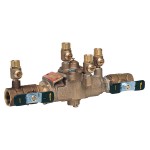- Written by water

A double check valve, or double check assembly (DCA), is a backflow prevention device designed to protect water supplies from contamination. Call us at (817) 996-2000 or further explanation after reading this article.
It consists of two check valves assembled in series. This employs two operating principles: firstly one check valve will still act, even if the other is jammed wide open. Secondly the closure of one valve reduces the pressure differential across the other, allowing a more reliable seal and avoiding even minor leakage.
Backup system of check valves
Small valves may be so compact as to be barely noticeable, particularly when they are integrated into the bodies of existing taps (faucets). Larger check valves may be installed with ball valves at the ends, for isolation and testing. Often, test cocks (very small ball valves) are in place to attach test equipment for evaluating whether the double check assembly is still functional.
What is a double check valve suitable for?
The double check valve assembly is suitable for prevention of back pressure and back-siphonage, but is not suitable for high hazard applications. It is commonly used on lawn irrigation, fire sprinkler[1] and combination boiler systems. If the hazard is higher, even a relatively low hazard such as using antifreeze in the fire sprinkler system, then a more reliable check valve such as a reduced pressure zone device may be mandated.
Is a double check valve necessary where you live and work?
Most likely yes! Every city in the State of Texas has its own backflow prevention regulations. To find out what those are simply search the official city website for “backflow prevention.” The general guidelines for each city are fairly standard, as per federal regulations regarding backflow prevention. Those regulations generally follow these standard requirements:
- All backflow testers and inspectors must be registered with the City of Cedar Hill
- All backflow inspection testing reports must be filed with the City of Cedar Hill
- All new back flow preventor devices must be tested before installation by a licensed backflow tester, and their place of origin noted on the test report.
Let’s briefly consider each point. Backflow testing requires only trained and licensed backflow testers. It is not enough to simply call a plumber to do your back flow testing; that plumber must be trained in proper backflow procedures and regulations.
They must also file an annual report with the city stating that your backflow system is working properly.
And all backflow devices, including thee double check valves, test cocks, double check assemblies, and pressure zone devices must be tested before installation and must be from an approved manufacturer.
With something as important as the prevention of backflow, make sure you place your trust in the very best of available backflow testing companies. In the Greater Fort Worth area, the trusted company to call is City Backflow Testing, trusted and licensed in more than twenty cities in and around Fort Worth. With years of backflow experience, City Backflow Testing has paid their dues and earned the trust of millions.
Give us a call for an appointment today . . . (817) 996-2000.
Posted in Backflow Prevention

